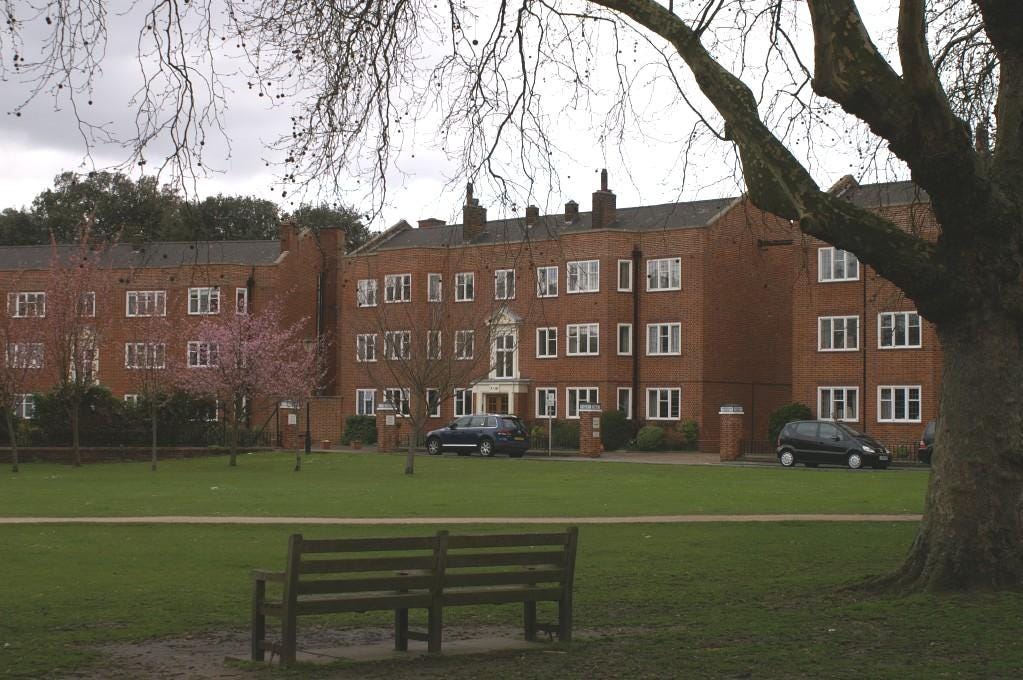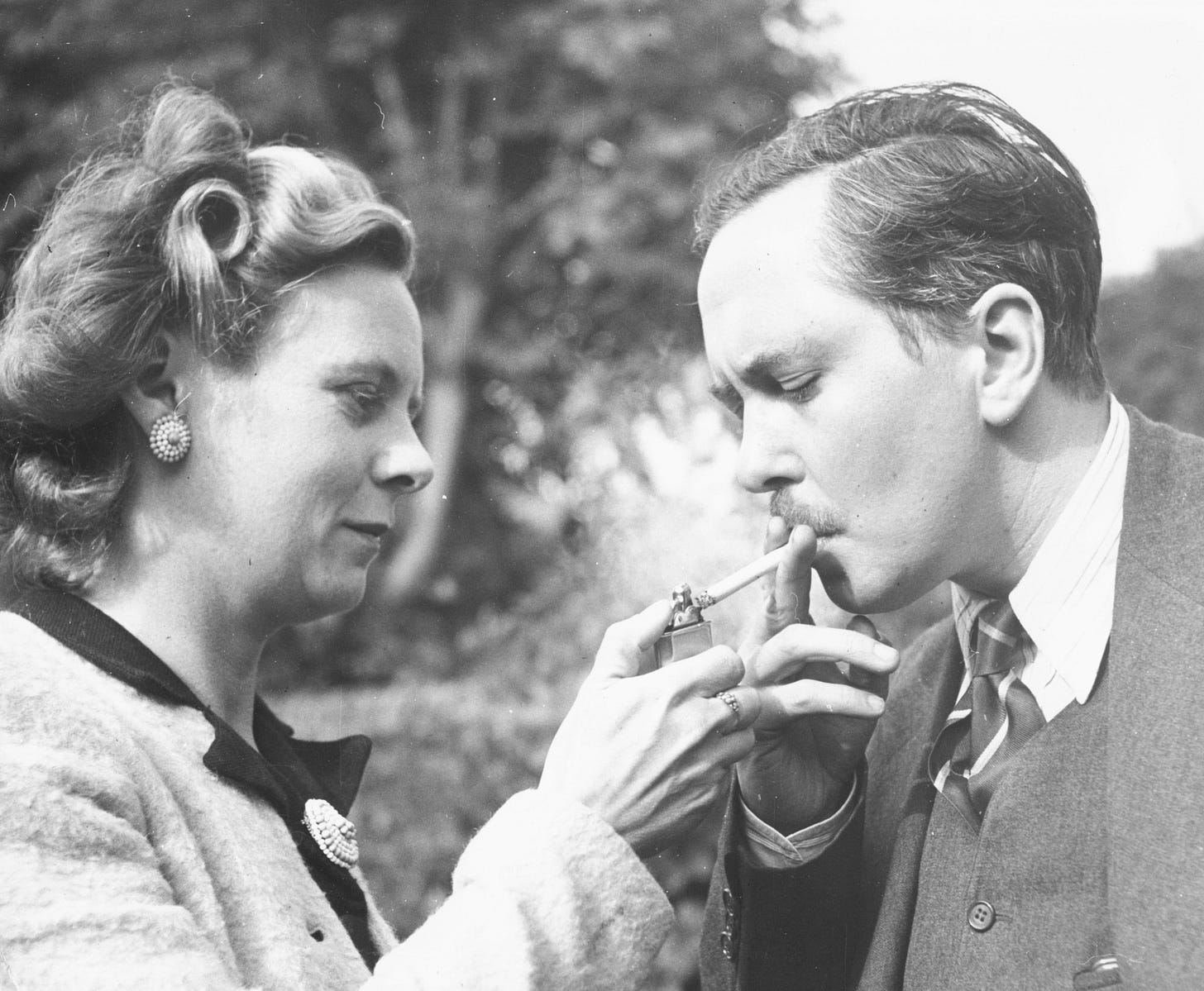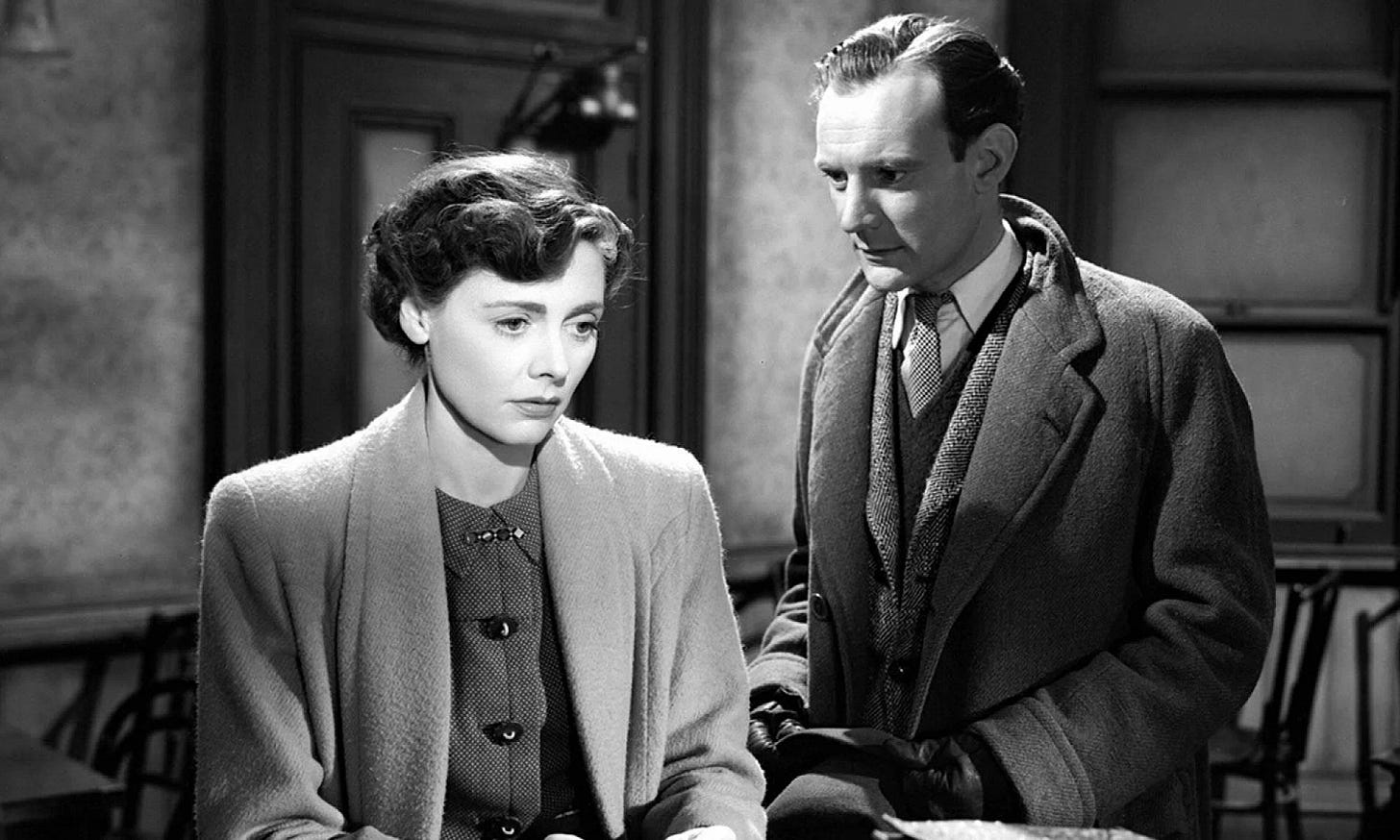The years between 1940, when Mary and Harold Wilson married, and 1964, when Harold became Prime Minister, might be assumed to be one smooth upward path for Mary: her husband increasingly consumed by political activity and ambition, while Mary minded the house and brought up her two little boys. But as has become clear since both their deaths, in revelation and gossip piled upon revelation and gossip, nothing was straightforward about this marriage. It seems increasingly likely that Harold’s relationship with his political secretary, Marcia Williams (or Lady Falkender, as she became) was at some point more than just professional. And Mary? Well to me the mystery lies in a sequence of some of the most beautiful and heartfelt love poetry - verses that exude passion, longing, renunciation and regret.
O that we might, for one brief hour
Forget that we are bound apart
And lie within each others’ arms
Mouth pressed on mouth, and heart on heart.
For just one hour, from all our life
To sink unchained through passion’s deep
And, cast upon the farther shore
To lie entwined in tender sleep!
Mary and Harold Wilson were married in Oxford on 1 January 1940, and set up home together in a one-bedroom flat on South Parks Road, where for a short while Mary was able to pretend that her dream had come true, and that she was living the life of a don’s wife in the city she was growing to love. However, after just a few weeks working on statistics with William Beveridge, Harold joined the Ministry of Supply. At least Mary never had to worry about her husband being called up for military service - his progress through the bureaucratic ranks at Whitehall was rapid and impressive. With some regret Mary followed him to London, moving frequently from rented rooms in Earls Court, to Pimlico and then to a top floor flat in Twickenham. When the Blitz began that autumn, top floor flats seemed less attractive: Mary went down to Cornwall to stay with Harold’s parents, then briefly back to Oxford, while Harold camped in civil service accommodation near his office. Soon they found a flat to rent in an attractive location in Fitzwilliam House on Richmond Green, to the west of London. At least while Harold was away at nights, Mary had a cat to keep her company, Kubla Khan, but then the cat was killed in a bombing raid while Mary was away.
In the autumn of 1943, Harold was sent to Washington in his role as Secretary to a Whitehall sub-committee dealing with coal stocks - not ideal timing, as Mary was expecting their first child. Robin was born in December 1943, and Mary decided to leave London again, to keep the baby safe - initially she returned to Harold’s parents in Cornwall, but then to Duxford in Cambridgeshire, to stay with her own parents. Meanwhile Harold was getting itchy feet - change was in the air, and across the country the Labour Party was beginning to gear up for the inevitable General Election that would follow the end of war in Europe. The hunt was on for suitable candidates. Mary understood that Harold did not want to spend the rest of his life as a civil servant, or even teaching economics to students, but the decision to look for a seat as early as 1944 may have taken her by surprise. The press reports of his rapid selection as the labour candidate for Ormskirk, a market town halfway between Liverpool and Southport, make no mention of his wife and baby. Adoption as a candidate required him to resign immediately from the Civil Service, so he, Mary and Robin went back to Oxford, where Harold took a temporary job as Domestic Bursar at University College. At least this came with accommodation in the dons’ lodgings: soon Mary was taking Robin to play and hanging out the nappies in the Fellows’ Garden. She was living where she was at her happiest - out of the reach of the doodlebugs raining down on London and back among old friends, in her favourite city.
She wrote about wartime Oxford in one of her lovelier poems:
The silenced bells hang mutely in the towers,
The stained-glass windows have been taken down
To Wales, to shelter underneath the mountains;
And battledress has shouldered-out the gown.
And undergraduates, waiting for the call-up,
And feeling restless and dissatisfied
Are fighting with Australians in the Milk Bar;
Yet soon they will be serving side by side….
The poem is brim-full of memories, but there is the rising beat of War, and the impact it is having on young men…
And as the evening mists rise over Isis,
The RAF flood in from Abingdon
To the Kings Arms, to play bar billiards;
…
And we all live as if there’s no tomorrow -
Indeed for some of us, there will not be -
And ‘til the bugle calls us to the conflict
We sit in the Cadena drinking tea.
So far, so nothing special…But it is the final verse that always brings a lump to my throat and a mist to my eyes:
Those wartime years have gone, and left no traces,
Fresh tides of youth have swept them all away;
New buildings have arisen by the river,
And there are few who think of yesterday;
Yet sometimes, in the middle of September
Though Spitfires scream no more across the sky,
As dusk comes down, you cannot see the pavement
Where ghosts in blue are walking down the High.
Oxford in Wartime, from New Poems, by Mary Wilson
In July 1945 Harold was elected to Parliament and Mary found herself the wife of a young MP, already singled out for rapid promotion in the new Labour Government. The Ormskirk campaign had been a new experience for both of them, and Mary rapidly decided that it wasn’t her thing ‘A lot of shouting and anger, and at the end of it I found I was actually trembling.’ She didn’t accompany him to the count, and once elected, when he had to be in London Monday to Friday, she stayed on in Oxford, now living down the Banbury Road in a college flat. Harold’s rise through the ranks was unprecedented: an MP at the age of 29, a Minister within weeks of the election, and in September 1947 he was appointed President of the Board of Trade, the youngest person to have been appointed to the Cabinet during the twentieth century, at the age of 31. But the pressure on Harold, and on the marriage was proving too much: they could only retain the Oxford flat if Harold taught students at weekends, and this combined with ministerial duties and constituency visits to Ormskirk was unviable.
It’s hard to imagine the pressure Mary was under in the mid-1940s. She had a little boy to look after. Her father in Duxford had fallen ill, and died in October 1945, leaving very little for his widow to live on. Mary had no sister to support her, and the Wilson parents-in-law were at the other end of the country in Cornwall. She did not find it easy to make friends among the wives of the Oxford academics. As she herself said ‘I am an introvert…I admit with the best will in the world, I don’t find it easy to talk to strangers.’ Pile on top of that her lack of a university education and her non-conformist, teetotal background - sherry parties must have been a nightmare. Life was tough as it was: Britain was in the grip of rationing: food, clothing, petrol. And Harold was away so much, and when he was at home he was working. For the last three months of 1946, Harold was in Washington, leading trade negotiations. From January to March 1947, most of the country was buried in ice and snow in the Big Freeze. When Harold was promoted again in September of that year, Mary complained to the Daily Mirror ‘That means I shall see less of him than ever. He works a sixteen hour day already, I saw him for two weekends only during the summer.’ When he was appointed to the Board of Trade, her complaints got louder ‘He is supposed to visit us at weekends, but out of the last fifteen, he’s had two free ones.’
It is not as if Mary could find mutual support from other women in the political arena in which her husband was operating. Unlike the wives of Harold’s young contemporaries, such as Audrey Callaghan, Jennifer Jenkins, Edna Healey, Mary had never been engaged in political activity. (Prior to 1944, there was very little evidence of Harold being active, either. For most of his time as an undergraduate, he was a member of the University Liberal Club, not the Labour party, which he considered ‘full of Southern toffs’). Later in life, Mary would develop a reputation as a left-winger, more radical than her husband in her views on Europe (anti-Common Market) and defence (anti-nuclear). But she tried to keep her views to herself, and politics out of her family life.
Finally bowing to the inevitable, Harold gave up his academic work, and the flat, in Oxford. In 1948 the couple bought a semi-detached house in Southway, a tree-lined avenue in Hampstead Garden Suburb, where they would live for nearly twenty years, until the 1964 election took them to Downing Street. Here, after a life of moving from place to place, Mary built a shelter for herself and her children, away from the cut and thrust of Westminster politics. She became particularly defensive of this, her home patch, and warned Harold against bringing his colleagues home. A close friend, Marjorie Kay, would tell a journalist ‘ “Home” was a word which meant more to her than it does to most women, probably because she had moved all over England too often as the daughter of a Congregational Minister.’
So, where is the mystery in all this? It lies in trying to guess what lay behind Mary’s love poems. Although she dedicated her first published collection to Harold, it is hard to identify any poems in the book which relate to her marriage. But the verses I quoted at the start of this piece are by no means the only one. The one that curious journalists often refer to is The Train: ‘How like a man to choose a crowded train/To say that we must never meet again…’. But then there is also Winter Parting ‘But still I cannot put away my grief/Nor have I learned to live without your love.’. And another poem with no title ‘And so, my darling, free from bitterness/We gaze upon that Eden we must leave,/And, sighing, turn to face the Wilderness/Regretful Adam, and reluctant Eve.’ And there seems to be a companion piece to this: ‘You have turned your back on Eden/ And shut the garden gates…And the apple lies where you let it fall;/And the serpent laughs at you over the wall.’
This is, after all, the era of Brief Encounter, a film released in 1945, when the lonely wife and mother turns away from temptation and remembers her duty. When the poems were first published in 1970, she was quoted in the New York Times ‘The love poems were written a very long time ago. Let’s leave it at that. One goes on to other things.’
In 1977, a biography of Harold Wilson was published, written by Andrew Roth, which made specific claims about Mary’s life during these early years of the marriage: the Wilsons sued and the publishers apologised and paid damages. Mary denied having been unfaithful, and to me it is unbelievable that she would have lied in Court. I haven’t yet inspected the Court documents, but they are available at the Bodleian Library. I have no desire to speculate about what was in Mary’s heart when she wrote these beautiful poems: all I can hope is that this was true for her:
But perhaps, as you write by your window/ On a day of tender spring/You will stop your work for a moment/To hear a blackbird sing./ And will catch an echo soft and clear/ Of far-away music you cannot hear.
There were new loves waiting for Mary: her second son, Giles, was born in 1948, and she had important platonic friendships with two kind and brilliant men, John Webster, the organist, and John Betjeman, the poet, which I will write more about in the final part. And perhaps more important than either of these men was her love for the Scilly Isles, first visited in 1951, where the Wilsons bought a holiday home and which became a haven of peace for all the family.
All extracts of poems are from Mary Wilson’s Selected Poems, published by Hutchinson, 1970, reproduced with kind permission of her family.









This is such a lovely account of someone who seems through no fault of her own to have ended up in a life to which she's not suited and didn't want but nevertheless finds a way through. It's such an unglamorous period too, but that also has a kind of charm. I feel intrigued by Harold Wilson too and in a way sorry for him in this account: he may have imposed his political career but teaching at weekends to keep up and Oxford flat his wife loved while a minister is impressive!
Will you mention Private Eye's Mrs Wilson's Diary in later installments? I've never read them but remember Denis Thatcher's later on, and the Mrs Wilson columns were meant to be the inspiration.
Fascinating read